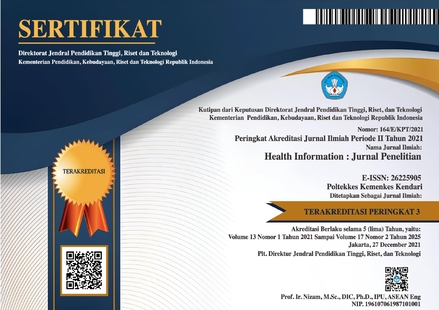Analysis of differences in the number of Aedes sp. Trapped in Standard Ovitrap and Bamboo Ovitrap
DOI:
https://doi.org/10.36990/hijp.vi.149Keywords:
Aedes sp., Bamboo, Mosquito, OvitrapAbstract
Dengue Hemorrhagic Fever (DHF) is an infectious disease that occurs because of dengue virus infection, which is carried by the vector Aedes sp. Kendari City is one of the dengue-endemic areas in Southeast Sulawesi Province. Some control programs of Aedes sp. so far less successful because it places more emphasis on fogging for adult mosquitoes. There are methods of controlling Aedes sp. without insecticide which has so far reduced vector density in some countries, namely the use of egg traps (ovitrap). This study aims to determine differences in the number of eggs trapped in standard ovitrap and bamboo ovitrap. This research is an observational study with a cross-sectional method. The results showed that the p-value 0.6168 which meant that there was no difference between mosquito eggs trapped in standard ovitrap and bamboo ovitrap.
References
Barrera, R., MacKay, A. J., & Amador, M. (2013). A novel autocidal ovitrap for the surveillance and control of aedes aegypti. Journal of the American Mosquito Control Association, 29(3), 293–296. https://doi.org/10.2987/13-6345R.1
Beech, C. J., Nagaraju, Vasan, S. ., Rose, R. I., Othman, R. Y., Pillai, V., & Saraswathy, T. . (2009). Risk analysis of a hypothetical open field release of a self-limiting transgenic Aedes aegypti mosquito strain to combat dengue. Asia Pacific Journal of Molecular Biology and Biotechnology, 17(3), 99–111.
Boewono, Barodji, D., Ristiyanto, S., Widyastuti, W., Traspsilowati, U., Blondine, W., Suskamdani, C., Errytrina, A., Zuraidah, K., & Soenarto, N. (2006). Studi komprehensif penanggulangan dan analisis spatial transmisi demam berdarah dengue di wilayah kota Salatiga. Prosiding Seminar Sehari “Strategi Pengendalian Vektor Dan Reservoir Pada Kedaruratan Bencana Alam Di Era Desentralisasi", 98–115.
de Resende, M. C., Silva, I. M., Ellis, B. R., & Eiras, Á. E. (2013). A comparison of larval, ovitrap and MosquiTRAP surveillance for Aedes (Stegomyia) aegypti. Memorias Do Instituto Oswaldo Cruz, 108(8), 1024–1030. https://doi.org/10.1590/0074-0276130128
Indonesia, K. (2018). Profil Kesehatan Indonesia Tahun 2017.
Mackay, A. ., Amador, M., & Barrera, R. (2013). An improved autocidal gravid ovitrap for the control and surveillance of Aedes aegypti. Parasites Vector, 6(225). https://doi.org/https://doi.org/10.1186/1756-3305-6-225
Mumpuni, Y., & Lestari, W. (2015). Cekal (cegah & tangkal) sampai tuntas demam berdarah (A. Sahala (ed.)). Rapha Publishing.
Nadhiroh, S. A., Cahyati, W. H., & Siwiendrayanti, A. (2018). Perbandingan Modifikasi Ovitrap Tempurung Kelapa dan Ovitrap Standar dalam Memerangkap Telur Aedes sp. HIGEIA (Journal of Public Health Research and Development), 2(1), 137–148.
Norzahira, R., Hidayatulfathi, O., Wong, H. M., Cheryl, A., Chew, H. S., Lim, K. W., Sing, K. W., Nazni, W. A., Lee, H. L., Mckemey, A., & Lacroix, R. (2011). Ovitrap surveillance of the dengue vectors, Aedes (Stegomyia) aegypti (L.) and Aedes (Stegomyia) albopictus Skuse in selected areas in Bentong, Pahang, Malaysia. Tropical Biomedicine, 28(1), 48–54.
Polson, K. A., Curtis, C., Moh Seng, C., Olson, J. G., Chantha, N., & Rawlins, S. C. (2002). The Use of Ovitraps Baited with Hay Infusion as a Surveillance Tool for Aedes aegypti Mosquitoes in Cambodia. Dengue Bulletin, 26, 178–184.
Rozilawati, H., Tanaselvi, K., Nazni, W. ., Mohd Masri, S., Zairi, J., Adanan, C. ., & Lee, H. . (2015). Surveillance of Aedes albopictus Skuse breeding preference in selected dengue outbreak localities, peninsular Malaysia. Tropical Biomedicine, 32(1), 49–64.
Satoto, T. B. T., Alvira, N., Wibawa, T., & Diptyanusa, A. (2017). Controlling factors that potentially against transmission of dengue hemorrhagic fever at state elementary schools in Yogyakarta. Kesmas: National Public Health, 11(4), 178–184. https://doi.org/10.21109/kesmas.v11i4.1248
Soedarto. (2012). Demam Berdarah Dengue. Sagung Seto.
Syarifah, N., Rusmatini, T., Djatie, T., & Huda, F. (2008). Ovitrap Ratio of Aedes aegypti Larvae collected inside and outside Houses in a Community Survey to Prevent Dengue Outbreak, Bandung, Indonesia, 2007. The 3rd ASEAN Congress of Tropical Medicine and Parasitology. Parasites: A Hidden Threat to Global Health, 116–120.
Teng, T. B. (2001). New Initiatives in Dengue Control in Singapore. Dengue Bulletin, 25, 1–6.
WHO. (2004). Pencegahan dan pengendalian dengue dan demam berdarah. EGC.
Wijayanti, S. P. M., Anandari, D., & Maghfiroh, A. F. A. (2017). Pengukuran ovitrap index (OI) sebagai gambaran kepadatan nyamuk di daerah endemis demam berdarah dengue (DBD) kabupaten Banyumas. Jurnal Kesmas Indonesia, 9(1), 56–63.
Downloads
Published
Versions
- 2021-04-13 (2)
- 2020-06-30 (1)
How to Cite
Issue
Section
Citation Check
License
Copyright (c) 2020 Askrening, Reni Yunus, Susilawati

This work is licensed under a Creative Commons Attribution-ShareAlike 4.0 International License.
Authors retain copyright and grant the journal right of first publication with the work simultaneously licensed under a Creative Commons Attribution-ShareAlike 4.0 International License that allows others to share the work with an acknowledgment of the works authorship and initial publication in this journal and able to enter into separate, additional contractual arrangements for the non-exclusive distribution of the journals published version of the work (e.g., post it to an institutional repository or publish it in a book).















